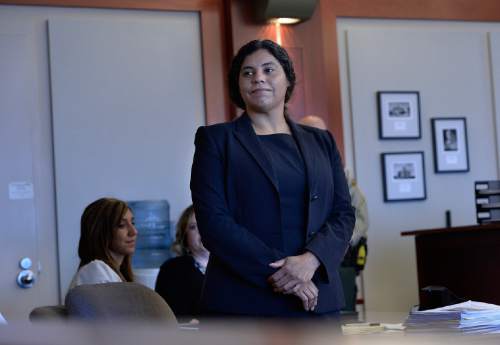This is an archived article that was published on sltrib.com in 2015, and information in the article may be outdated. It is provided only for personal research purposes and may not be reprinted.
Salt Lake County officials are rethinking how best to provide legal counsel for indigent offenders — a $17 million bill each year.
Having a right to counsel is guaranteed by the U.S. Constitution's Sixth Amendment, so for 30 years, the county has fulfilled that responsibility through a contract with the Salt Lake Legal Defender Association.
But there's been some problems with that contract in recent years, driven largely by a growing disparity between the pay and benefits earned by defense attorneys compared to what prosecutors make in the district attorney's office.
And with the nonprofit Sixth Amendment Center coming out with a study this fall for the Utah Judicial Council on the statewide delivery of indigent defense services, the county is considering three approaches to create more equity in the pay packages of opposing attorneys.
All have pros and cons, said Lori Bays, the county's director of human services, which includes indigent defense.
One option would be to make the attorneys and staff of the Legal Defender Association employees of the county. That would cost about $1 million, Bays said, with almost two-thirds being used to bring legal-defender salaries up to parity with prosecutors.
Another would be to scrap the contract with the Legal Defender Association and to put the job out for bid. This approach also is likely to produce higher costs for the county, Bays said, but would relieve it of responsibility for the defenders' salary levels and would increase transparency and accountability.
A third choice would be to have the Legal Defender Association contract come up for renewal every year or two, providing a recurring time frame for raising the legal defenders' pay to match that of district attorneys.
While merging the legal defenders into the county might seem like the best solution, Bays noted that could run afoul of the American Bar Association's "10 Principles Framework." One of its important tenets is that defense attorneys should be independent.
"Bringing LDA on as county employees would negatively impact that independence," she said, even if it could reduce the sometimes crushing workload faced by legal defenders and lessen the compensation disparity.
Whatever direction the County Council goes, Bays also suggested a position be created to oversee an array of indigent services.
Besides legal counsel on criminal matters, she said, services include sanity hearings, matters involving juveniles, working with indigent parents and guardians of minors, and dealing with conflict resolution.
"That's a $17 million budget that essentially has little oversight," Bays said, pointing out that the bottom line for indigent care is bigger than the county youth- services budget.
Patrick Anderson, who manages the Legal Defender Association, said he wasn't certain additional oversight is needed, especially if the Sixth Amendment Center study recommends a much larger supervisory role at the state level. Utah is currently one of only two states (Pennsylvania is the other) that give nothing to counties to pay for indigent defense.
"Let's hold tight until this study comes out," advised Democratic County Councilman Jim Bradley.
"Some County Council members need thinking time on this," concurred Republican Councilman Max Burdick.







